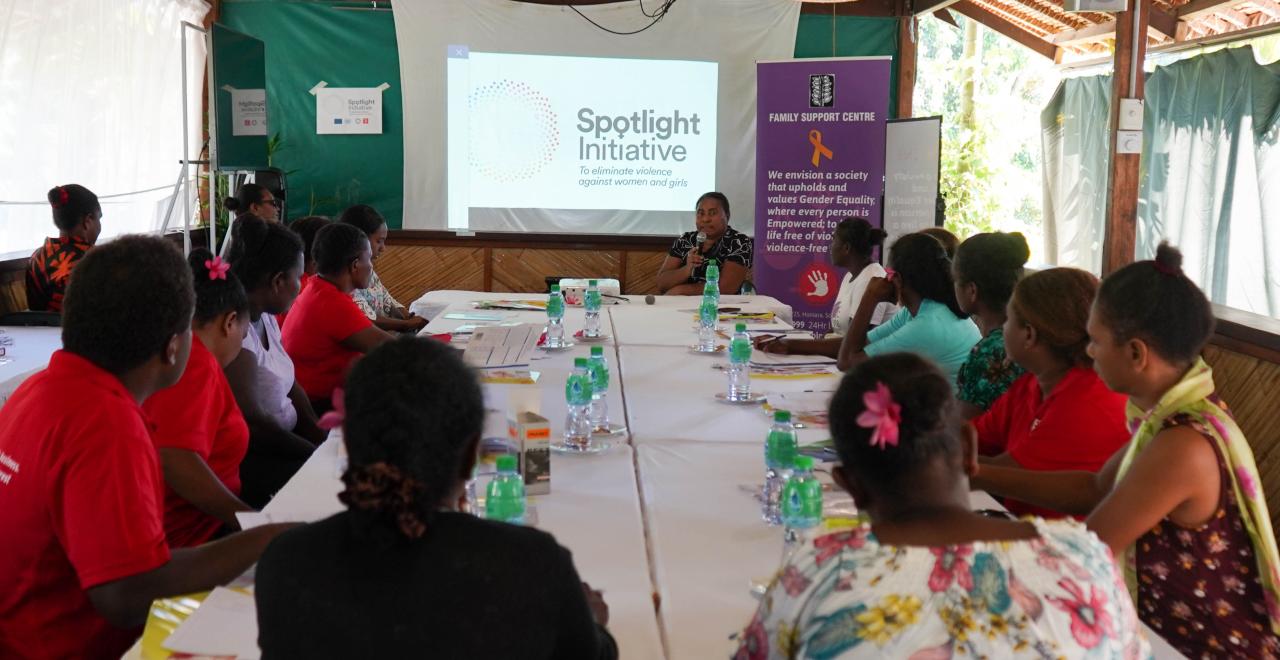Gender-responsive budgeting: empowering civil society organizations with a new advocacy tool

HONIARA, Solomon Islands - How much money is spent on ending violence against women and girls, advancing gender equality and women’s empowerment? What is the cost of violence to families, communities and Pacific Island countries?
Civil Society Organizations (CSOs) working on gender equality and ending violence against women and girls (EVAWG) joined a workshop in Honiara, Solomon Islands last week to learn more about calculating the cost of violence and the role of gender-responsive budgeting (GRB) in ensuring that organizations, Ministries and the Government deliver on long-term gender equality and women’s empowerment goals across sectors.
The two-day workshop, organized by the Family Support Centre (FSC) in cooperation with UN Women, and with the support of the Spotlight Initiative, involved participants from the FSC provincial committees working in EVAWG, representatives from the National and Provincial Council of Women, and members from other women-led organizations.
“The Solomon Islands Government has made huge commitments to progress gender equality through policies and legislation. However, there are immense challenges in translating these commitments into our national budgetary processes,” said Vaela Ngai, Director for the Women’s Development Division, Ministry of Women, Youth, Children and Family Affairs.
“This workshop is very important to ensure civil society organizations understand our budgetary processes and can play a key role in advocating for gender-responsive budgeting”, concluded Vaela Ngai.
In recent years, Solomon Island has committed to gender equality across several policies, at the national and regional levels. These include the 2016 Solomon Islands Gender Equality and Women Development Policy, with one outcome focused on whole-of-government gender mainstreaming, and the Eliminating Violence Against Women and Girls Policy 2016-2020.
“This workshop is very important to ensure civil society organizations understand our budgetary processes and can play a key role in advocating for gender-responsive budgeting.” - Vaela Ngai
Gender-responsive budgeting is an effective tool in helping progress gender mainstreaming within the Government.
Gender-responsive budgeting seeks to ensure that the collection and allocation of public resources is carried out in ways that are effective and contribute to advancing gender equality and women’s empowerment. It is not about creating separate budgets for women, or solely increasing spending on women’s programmes.
“This workshop enables participants to analyze any budget presented, be it at the CSO or provincial government level, and understand whether it is budget-support to the work on gender or truly transformative gender-responsive budget,” said Lorio Sisiolo, Manager, Family Support Centre.
Along with legislation, and other policy measures, GRB analysis is foundational to addressing gender bias and discrimination. It is a step not only toward accountability for women’s rights, but also towards greater public transparency. it can shift economic policies leading to gains across societies.
“Women organizations collectively have an important responsibility to ensure GRB as a tool is effectively used to monitor and track progress in how the allocation of national budgets and resources benefit all genders. I felt empowered with the new knowledge on GRB that I learned today,” said Phillistus Fafoi, Board Member, National Council of Women.
Participants from the various sectors shared their views on the benefits of GRB and the training that would be incorporated into their work.
“As a provincial government representative, this workshop has incredibly contributed to my understanding of GRB. This training has expanded my knowledge of what a proper gender-responsive budget planning looks like. I look forward to returning to my province and sharing this knowledge with the provincial public accounts committee and heads of provincial government departments who are directly involved in provincial government budgeting processes,” said Lissy Wong Benet, Women’s Development Division officer, Western Provincial government.
“CSOs and government entities’ capacity in GRB must be strengthened for effective gender-responsive budgeting to happen. CSOs have a key role to hold governments accountable in GRB” - Lissy Wong Benet
“CSOs and government entities’ capacity in GRB must be strengthened for effective gender-responsive budgeting to happen. CSOs have a key role to hold governments accountable in GRB”, concluded Lissy Wong Benet.
“I now understand what GRB is about. As a frontline GBV service provider, I provide counselling services and GBV awareness in rural communities. This training has given me new insights on how important it is that I think about how women, men, boys and girls, and vulnerable groups such as people with disabilities are inclusively benefiting,” said Janet Havibrou, FSC provincial representative.
“GRB can be effectively implemented if decision-makers and key people involved in budgetary processes understand this concept well and appreciate how it benefits all genders,” she concluded
The Spotlight Initiative is a global initiative of the United Nations which has received generous support from the European Union. Its aim is to eliminate all forms of violence against women and girls.
By Cristina Comunian
